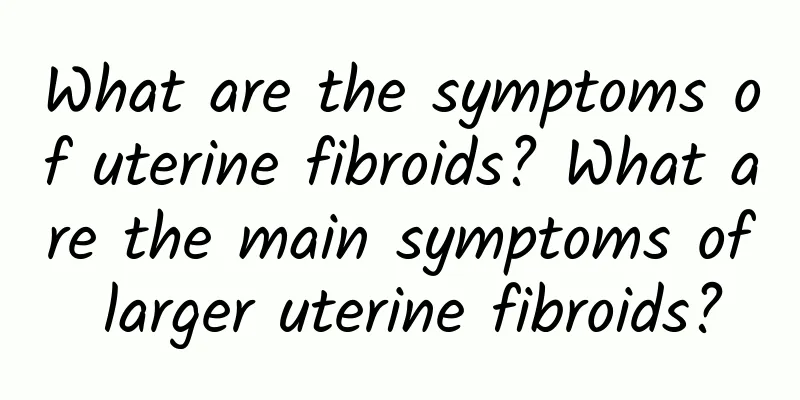What are the symptoms of uterine fibroids? What are the main symptoms of larger uterine fibroids?

|
Uterine fibroids are a common female disease characterized by abnormal growth of muscle tissue in the uterus, forming a mass. Most uterine fibroids are benign, but in some cases they can cause a range of symptoms and problems. This article will describe the symptoms of uterine fibroids, focusing on the main symptoms of larger uterine fibroids. Let’s first look at the symptoms of uterine fibroids. 1. Abnormal menstruation: Uterine fibroids may cause increased menstrual flow, prolonged menstrual periods, and even irregular menstruation. Some women may even experience symptoms of menstrual blood clots. 2. Abdominal pain and pressure: Smaller uterine fibroids may not cause pain, but when the fibroids grow larger or increase in number, women may feel abnormal pressure or pain in the lower abdomen. 3. Difficulty urinating: When uterine fibroids grow larger, they may compress the bladder, leading to symptoms such as frequent urination, urgency, and pain when urinating. 4. Constipation or diarrhea: The growth of uterine fibroids may also put pressure on the intestines, causing symptoms of constipation or diarrhea. 5. Painful sexual intercourse: Some women may feel pain or bleeding during sexual intercourse, which may also be one of the symptoms of uterine fibroids. Next, let’s discuss the main symptoms of larger uterine fibroids in detail. Larger uterine fibroids tend to cause more noticeable symptoms, such as the following: 1. Abdominal lumps: When uterine fibroids grow to a certain size, one or more lumps can be felt in the abdomen, which is the most obvious symptom. The lumps are usually hard and of varying sizes. 2. Dysmenorrhea: Larger uterine fibroids may also cause dysmenorrhea. Women may feel abdominal pain or discomfort in the lower abdomen during menstruation. 3. Anemia: Some women may develop anemia due to increased menstrual flow caused by uterine fibroids. Anemia can cause symptoms such as fatigue, shortness of breath, and dizziness. Uterine fibroids are a common gynecological disease with symptoms including abnormal menstruation, abdominal pain, pressure, dysuria, constipation, diarrhea, and painful sex. Larger uterine fibroids may cause more obvious symptoms, such as abdominal lumps, dysmenorrhea, and anemia. If you suspect you may have uterine fibroids, it is recommended that you consult a doctor for diagnosis and treatment in a timely manner so that you can recover. |
Recommend
Dysmenorrhea may be caused by psychological factors
Dysmenorrhea may be caused by psychological facto...
How to treat chronic cervicitis in women? What are the advantages of ozone treatment for chronic cervicitis in women?
In life, many women suffer from gynecological dis...
Is bacterial vaginosis contagious?
Bacterial vaginosis in women causes congestion an...
Does female cervical erosion affect pregnancy? How to treat female cervical erosion?
Once cervical erosion is detected during pregnanc...
Will cervical erosion cause back pain? It is a normal physiological phenomenon
Cervical erosion is a normal physiological phenom...
The hazards of several common adnexitis
Adnexitis is a common gynecological inflammation,...
Lose weight after the New Year with this! Drinking water before meals helps lose weight
To lose weight after the New Year, seize the 30-d...
What causes lower abdominal pain in women?
Many women have uterine problems. The uterus is w...
Experts guide the correct use of drugs for cervical precancerous lesions
Compared with other cancers, cervical precancerou...
What is aggravated dysmenorrhea?
If women have worsening dysmenorrhea, especially ...
How can an ectopic pregnancy be detected?
Ectopic pregnancy is a highly harmful gynecologic...
How to diagnose acute and chronic pelvic inflammatory disease?
Chronic pelvic inflammatory disease and endometri...
How to treat inflammation of the cervix and adnexitis
How to treat adnexitis and cervical inflammation?...
How much does it cost to treat cervical erosion?
Cervical erosion is one of the main gynecological...
Genes are the main cause of ovarian cysts
Ovarian cysts bring a lot of unspeakable pain to ...









